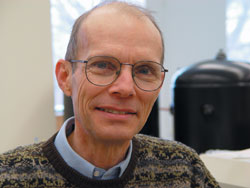


 |
Issue Contents :: Around Tappan Square:: Page [ 1 2 3 4 5 6 ]
Faculty in the Field: Choosing and Searching
 As citizens in voting booths, all we can do is choose. Even outside the voting booth, we choose among contending political positions. Freedom to choose and the ability to choose wisely are good, and not only in the political realm. But in what follows, I advocate being not just choosers, but searchers: searchers for the best solutions to problems, even when they challenge our current beliefs.
As citizens in voting booths, all we can do is choose. Even outside the voting booth, we choose among contending political positions. Freedom to choose and the ability to choose wisely are good, and not only in the political realm. But in what follows, I advocate being not just choosers, but searchers: searchers for the best solutions to problems, even when they challenge our current beliefs.
A few years ago I gained a new understanding of two philosophical movements: postmodernism and deconstruction. These movements had long alarmed me because they attack objectivity and the search for truth, both of which are central values for me, a scientist. I also was put off by some deconstructionists' discursive style and in-group vocabulary, which struck me as perversely obscure.
Nevertheless, I finally decided to read some sympathetic treatments of postmodernism and deconstruction. To my surprise, I found them a source of valuable insight. They caused me to become more wary of generalizations and principles, not only when these are flawed, but also when they distract me from the messy richness of the situations they summarize.
It was not that I changed sides. I still think that many postmodern criticisms of science do not do justice to the diverse ways in which sciences actually operate. Yet I learned valuable lessons from sources with which I still have serious disagreements. This should not have surprised me. On countless other occasions, I have learned from people with whom I disagreed. Although agreement is comforting, disagreement is a signal that I might be able to learn something.
Why am I confessing this? My experiences regarding postmodernism alerted me to the pervasiveness and limitations of choosing. Contemporary intellectual life is highly polarized. Much like political life, opposing camps either ignore each other or wage war. Each camp expects us merely to choose sides. I went along with this expectation for many years regarding postmodernism as I repeatedly encountered reasons to reaffirm my choice against it. But when I examined it closely with a more open mind, this search proved rewarding.
When a seemingly intelligent and well-intentioned person holds viewpoints that seem absurd or threatening to you, ask yourself why. A modicum of generosity and humility may help you find explanations. Explore the possibility that that person may know something important that has escaped your own attention.
When a group of contending positions presents you with a choice, I urge you to be a searcher: a searcher for the best contributions from each position; a searcher for inconsistencies within each position, in-cluding your own; a searcher for solutions overlooked by all contenders.
Searching is more active than choosing; it engages more your awareness and intelligence. Searching is therefore more demanding. It also is potentially humbling. Why go to the extra trouble of becoming a searcher? Three reasons: 1) Society's needs; 2) Your social situation; 3) Your inner life.
Society faces complex problems. In deal- ing with those problems, each profession and institution invokes different standards and a different ethos. A city's police department and its district attorney's office have markedly different priorities and methods, even though both agencies want to convict criminals while protecting the rights of the innocent. The differences create tensions but also enhance the criminal justice system.
The more the standards of a profession or institution become ingrained in its members, the more those members act on them automatically. Sometimes this leads to missed opportunities. Relaxing of professional standards is not the solution. Instead, professionals, as well as their critics, need to search for additional values or practical considerations that supplement those of the profession. I like to think that a liberal education enhances alertness to those supplemental perspectives.
For solving its problems, society needs more than opposing lawyer-like advocates who are skilled in defending their respective sides and attacking the opposition. Society also needs negotiators and judges who perceive and weigh the merits on both sides. These searchers may also notice important possibilities that the advocates overlook.
A second reason for being a searcher rather than a chooser is the changing social situation in which you find yourself. Many students have found Oberlin College to be more diverse than communities from which they came. But Oberlin is remarkably homogeneous on numerous issues. As alumni, your intellectual environments may be more heterogeneous than what you experienced in college–you may find yourself respecting people who hold positions with which you strongly disagree. This is a powerful incentive to rethink your own assumptions, facts, and positions.
Finally, you may care about the consistency of your own worldview–that mix of knowledge and faith that brings coherence to your understanding. Your worldview is continually being challenged by new events, new people, and the movies, plays, and books you encounter. Some people are remarkably adept at protecting their worldview from disruptive novel experiences. I hope that you will instead search for honest resolutions of those challenges to your views.
I wish you good searching.
Terry Carlton is an emeritus professor of chemistry at Oberlin.